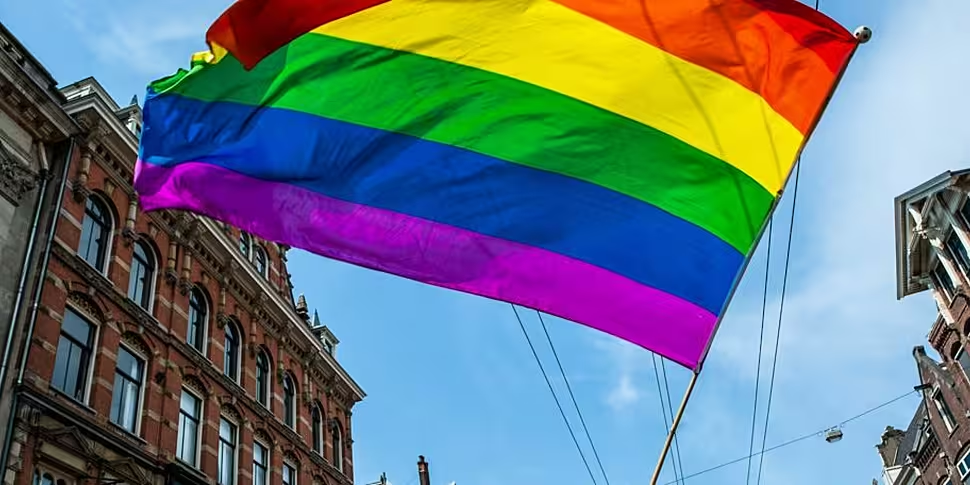Today marks National Coming Out Day, a "milestone" cited by 58% of young LGBTI+ people as their biggest challenge.
Figures from the Belong To youth service in Dublin says it is the number one issue they help young people with.
It comes as the Government launches a new programme today called Live Out Loud to celebrate LGBTI+ young people and to highlight their experience by sharing stories online.
Moninne Griffith, the CEO of Belong To, says National Coming Out Day is about sending a positive message.
She told Newstalk Breakfast with Susan Keogh: "For the vast majority of LGBT people [coming out] was something that was a major milestone and a really positive thing for them to do.
"This is something that is really positive and when a young person comes out to you what they're saying to you is that they love you, respect you, and want to include you as part of their lives.
"For some people, the big impact can be a negative one.
"Some parents find it difficult, for socialisation, from their own upbringing and it can be a bit of a shock.
"It's just about preparing people so they can be as supportive as possible and do the right thing."
📣 Our most recent research highlights that #ComingOut is the main challenge LGBTI+ youth face today, with 58% of our Dublin users reaching out for support about coming out as LGBTI+. 👉 https://t.co/ku7d23gQaP#ComingOutDay pic.twitter.com/wFNlxDydm2
— Belong To Youth Services (@Belong_To) October 11, 2020
Ms Griffith added that the main concern for a lot of young people is the fear of rejection.
She said: "12 is the most common age for a young person to realise they're different, that they may be LGBT.
"16 is the most common age for a young person to come out and tell another person.
"So those four years can be a very lonely time where you're wondering, 'will my family still love me, will my friends still accept me, will I be bullied in school or online if people know this about me'.
"That's where we see a lot of mental health issues can arise for LGBT young people during this period.
"When they come out, a lot of that anxiety goes away because for many, they get a lot of support, and love and acceptance from the people around them but obviously for some people that's not always the case."
'Kneejerk reaction'
Jason Pope was 14 when he began coming out to his friends and family.
He said: "For a lot of people, a lot of LGBT young people like me, coming out to your parents is kind of the biggest milestone.
"A lot of people's friends are generally very supportive and if they're not, it's not the same as not being accepted by your parents, that's kind of the big scary one."
Jason said he showed a letter he had written about being trans to some of his teachers and then gave it to his parents and left for the day for school.
He said: "I wanted them to have a bit of time to absorb it and not have to say anything to me on the spot because I think that sometimes people can have a kneejerk reaction that they're going to regret very quickly and that they're not going to be proud of the next day."
Jason said his mother had sent him a text message that day saying that his parents loved him.
He added: "I knew they weren't angry and there was a positive there but it was still nerve-wracking to then go home at the end of the day.
"I remember in the first while of me being out as trans a lot of these conversations with my mam about being trans were in the car because I didn't have to look at her."
'Strength to strength'
Jason said his life has gone "from strength to strength" since coming out as trans.
He said: "Because of the fact that my family have been very supportive, I was able to transition as a teenager which has been of huge benefit to me.
"I was able to legally change my name and my gender marker and medically transition so by the time I got to college, for the most part, I was where I wanted to be.
"I was able to be comfortable which is what I wanted all along."
🌈 Happy #ComingOutDay 🌈
Coming Out as LGBTI+ can feel like a weight off your shoulders. Saying that, coming out is about doing what feels right & safe for you. ❤️
Check out our handy guide for LGBTI+ youth & those who aren’t quite sure 👉 https://t.co/zJx3S0TV8m pic.twitter.com/ASxKrS83Ro— Belong To Youth Services (@Belong_To) October 11, 2020
Jason said that Belong To has been one of the biggest supports in his life as it "puts you in a space where someone understands how you feel".
He said: "You walk into a room of other young people who are going through similar things and even if their experience isn't identical to yours, they know what's going on, they understand what you're saying."
People who have not come out yet should "take their time" as "there's no rush to come out until you're ready", he said.
Ms Griffith added that parents who believe their child may be having these experiences should use language that shows the young person that they are open to having conversations and that they recognise there are different experiences with regard to sexual orientation or gender identity.
She said: "It's really just about signalling to them that you're open and able to talk about these issues when they're ready."









